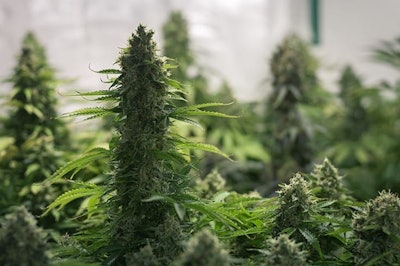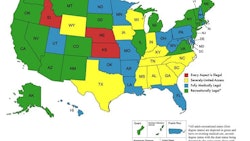
After years of regulatory limbo that allowed registered patients in Georgia to possess—but not purchase—low-THC cannabis oil, the state has established a regulated market and has licensed six businesses to produce and sell the oil.
However, some industry stakeholders question the state’s licensing process and the businesses that ultimately won the right to operate in Georgia’s market.
“The process was relatively secretive for these companies to go out and apply for and receive these licenses,” Ryan Ralston, executive director of Peachtree NORML, told Cannabis Business Times and Cannabis Dispensary.
In 2015, Georgia legalized the possession of cannabis oil containing a maximum of 5% THC. In 2019, Gov. Brian Kemp signed a bill that legalized the production and sale of low-THC cannabis oil in the state, and Ralston said Peachtree NORML followed this legislation closely.
“One of the things that really stuck out to us was the fact that if a grower was going to apply for a Class I or a Class II license, right off the bat, they were going to have to be willing to waive their Fourth Amendment rights,” he said. “Basically, if you were going to operate as a dispensary, you had to sign a Fourth Amendment waiver, allowing local, state, and federal officials and law enforcement officials at any given time to enter your property without a warrant and search your property. That was one of the initial red flags on the legislation that we opposed.”
Another requirement, Ralston added, was that applicants must have upwards of $1.5 million in cash on hand to qualify for a license.
“Basically, what the legislation allowed for was bigger conglomerates to come into Georgia and not [allow] the smaller growers and smaller farmers [to produce] the low-THC oil here in Georgia,” he said.
Many smaller farmers have been cultivating hemp in the state since the passage of the 2014 Farm Bill, Ralston said, and while they may have the infrastructure needed to grow cannabis and produce the low-THC oil, many did not have the required cash on hand to apply for a license.
“If you think about it, 80% of Georgia’s economy is based on agriculture,” Ralston said. “You’re basically shutting out the Georgia farmer, and you’re allowing bigger companies to come in and start buying up land and buying up production, when in fact the smaller business operator has been doing it for more than a decade.”
Sixty-nine companies applied for Georgia’s six cannabis licenses, which were ultimately awarded to Trulieve GA Inc., Botanical Sciences LLC, FFD GA Holdings, TheraTrue Georgia LLC, Natures GA LLC and Treevana Remedy Inc.
Trulieve GA Inc., an affiliate of Florida-based Trulieve Cannabis Corp., and Botanical Sciences LLC, a company located in Glennville, won Class I licenses to grow up to 100,000 square feet of medical cannabis, while the other four companies secured Class II licenses to cultivate up to 50,000 square feet.
Each licensee will be allowed to open five dispensaries to sell their low-THC cannabis oil, which can be recommended to patients for a host of qualifying conditions, including cancer, seizure disorders and multiple sclerosis.
The licensing process and the licensees themselves have been under scrutiny in the weeks since the licenses were awarded.
The Atlanta Journal-Constitution points out in a recent report that medical cannabis patients and advocates are questioning how these six companies were chosen following what the news outlet calls a “competitive but secretive selection process by the Georgia Access to Medical Cannabis Commission.”
Also receiving industry backlash is the announcement that former Georgia Congressman and Health and Human Services Secretary Tom Price is serving on Botanical Sciences’ board of directors, despite his history of opposition to cannabis policy reform.
“To have a guy who fought so diligently against everything we’ve worked so hard to accomplish here in Georgia and then receive a license, it was a tough pill to swallow,” Allen Peake, a former state representative who helped win the passage of Georgia’s medical cannabis law, and who was denied a license, told the Atlanta Journal-Constitution. “It’s the height of hypocrisy.”
Fifteen rejected applicants have filed protests against the licensing process, the news outlet reported, and Ralston said he foresees lawsuits on the horizon, which could cause further delays in the rollout of the program.
“It’s kind of been a bureaucratic nightmare down here,” he said.
Once the dust settles and licensing is finalized, licensees will have one year to begin operations, meaning that patients are still at least 12 months out from accessing the low-THC cannabis oil.
“It’s just further frustrating to Georgians, specifically to those who are sick, who are suffering and who are potentially dying, and they don’t have access to the low-THC oil,” he said.
The state could continue to struggle with supply to meet patient demand even after the businesses are up and running, Ralston added, especially since each dispensary is only permitted to serve a maximum of 20,000 patients under state law.
“They’ll be geographically scattered throughout the state, but they’ll only be allowed to take care of upwards of 20,000 patients per dispensary, so once … that particular dispensary reaches its allotted number of patients, Georgians are going to be turned away or they’re going to be forced to travel to a dispensary that may be three to five hours away,” he said. “It’s just going to further complicate the issue.”
Georgia currently has roughly 20,000 registered patients, and Ralston expects this number to grow rapidly as the program rolls out.
“What you’re going to see is the demand for these cards skyrocket over the next probably six to eight months, and I just don’t foresee the dispensaries being able to support that,” he said.

























